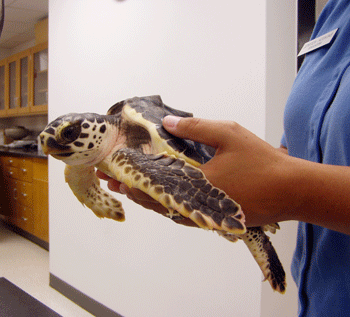Aquatic Animal Health
The Aquatic Animal Health group is led by Dr. Craig Harms, and performs investigations of marine mammal and sea turtle morbidity and mortality, identifies novel pathogens and parasites of aquatic animals, and conducts clinically-applied research aimed at improving health and welfare of captive aquatic animals.
Within NC
- Investigating antimicrobial resistance patterns in cloacal bacteria of loggerhead sea turtles.
- Investigating marine mammal stranding investigations in collaboration with NOAA National Marine Fisheries Services (NMFS).
- Assessing sea turtle health assessments in collaboration with NMFS and NC Wildlife Resources Commission.
- Identifying novel pathogens and parasites in marine mammals, sea turtles, sea otters and alligators.
- Evaluating efficacy of post-operative analgesics in fish.
- Determining immunomodulating effects of adverse water quality conditions on fish.

Outside NC
Field anesthesia of nesting and hatchling leatherback sea turtles in Trinidad for sensory biology investigations in collaboration with investigators from WIDECAST/Duke University Marine Laboratory
Extension and Outreach
The Marine Animal Health group, directed by Dr. Craig Harms, delivers veterinary care to the NC Aquariums at Roanoke Island, Pine Knoll Shores, and Fort Fisher, the Karen Beasley Sea Turtle Rescue and Rehabilitation Center on Topsail Island, and university field laboratories such as the Pamlico Aquaculture Facility in Aurora, NC.
Some specific examples in NC include:
- Health maintenance of collections of the North Carolina Aquariums at Pine Knoll Shores, Roanoke Island, and Fort Fisher.
- Veterinary services for the Karen Beasley Sea Turtle Rescue and Rehabilitation Center, Topsail Island.
- Development of new surgical and medical treatments for captive sharks, sea turtles, and cephalopods.
- Veterinarian services for the CMAST Fisheries Research Laboratory and the Pamlico Aquaculture Facility.
An example outside NC includes instructing sea turtle medicine classes in Grenada.